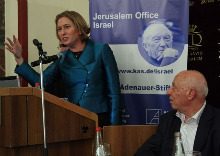Matt Rees's Blog - Posts Tagged "ehud-olmert"
A who's who of Israeli corruption
 In a small country you can find all the important decision-makers sweating in one gym.
In a small country you can find all the important decision-makers sweating in one gym. JERUSALEM — The heads of all the crime families in New York used to get together every Wednesday night at the Ravenite Social Club on Mulberry Street in Little Italy. If you were looking for an Israeli parallel, you could do worse than the gym I work out at.
The Cybex Club at the David’s Citadel Hotel has a nice view of the Ottoman walls of Jerusalem’s Old City. It’s also where the legal, political and business elite come to sweat (actually, being Israelis, they spend as much time talking as they do exercising). As I labor through my sit-ups, I’m surrounded by prime ministers, ministers, night club owners and restauranteurs, private detectives — all of them either under investigation, out on parole or formerly the targets of corruption probes.
The latest member of the Cybex cabal to hit the headlines is Uri Messer, who was arrested this week on charges of serving as an intermediary in an alleged bribery scheme. One leg of the alleged scheme is a former Cybex jock, ex-Prime Minister Ehud Olmert. (The manager used to open the gym half an hour early in the morning so Olmert could run 10 kilometers on the treadmill before 7 a.m.)
The gym is instructive, because it puts Israel into perspective. What you see of Israel on the news makes the place seem so central to world politics that it’s easy to forget what a tiny country it is — not just geographically, but also socially. Maybe there’s a gym or a bar in some of the smaller U.S. states where you might see pretty much everyone who counts in the decision-making of that region. But on a national level, there’s no such place. Washington’s just too big.
In Israel, a handful of places provide a social nexus for the elite, funneling the influence and connections that dominate a $200 billion economy, and Cybex is one of them. (Vermont, by contrast, is a $27 billion economy, one of 26 U.S. states with a smaller economy than Israel.)
Messer, a close friend of Olmert, admitted a couple of years ago to keeping a slush fund of hundreds of dollars in cash in a safe for then-Prime Minister Olmert. This time he’s charged with facilitating a bribery scheme to circumvent planning restrictions in Jerusalem.
The judges in Olmert’s corruption trial are currently deciding how to rearrange forthcoming hearings, given the new evidence surrounding Messer. The former prime minister already faces trial on three separate corruption investigations and is charged on counts of aggravated fraud, fraud, falsifying documents and tax evasion.
From my window I look across the valley at the result of this latest alleged bribery scandal: the Holyland complex, a weird Lego creation of apartments strung along a ridge with a 15-story tower beside it. Every committee and planning group in the city hated the idea, but it went ahead.
Now maybe we know why.
Well, Israelis knew all along. They understand the size of their economy is and how a relatively small group of men manages to maintain a hold on the profits. They also know that construction — fueled by rich American and French Jews who buy with their hearts, rather than their heads, for a sentimental foothold in Israel that they occupy for a few weeks a year — has been the easiest source of such profits. And the one most susceptible to corruption.
How pervasive is that corruption? Look at who else is implicated in the probe that snared Messer. The former municipal engineer for Jerusalem, Uri Sheetrit, at first opposed the Holyland project. Then he became a big proponent. What changed his mind? The police think they know. They’ve remanded him for a week.
It all struck me long before these allegations came out against Messer. You might say it’s instinctive to recognize it once you observe how the place works. This is a country where the average wage is $2,000 a month and a BMW costs $300,000 including taxes. The parking lot at the David’s Citadel was always full of BMWs, and I simply assumed such money was unlikely to be entirely licit. There wasn’t even the chance that these were bankers — which would make them unsavory but, grudgingly, legal earners — because Israel’s financial center is in Tel Aviv.
Then one day my Russian personal trainer was stretching my pectorals and whispering about the other people who happened to be in the gym at that moment. Given that it wasn’t very crowded, it was quite a list:
“That guy’s a private detective. He just got out of jail for blackmailing someone. That’s one of the two owners of the club I go to on Fridays. He’s been to jail for tax evasion. That guy owns a restaurant and all his partners went to jail for tax evasion.”
“Who? That guy?”
“No, the one next to him. The one you’re referring to owns a different restaurant. He actually was jailed for tax evasion. That woman was the education minister — clean, as far as I know. That guy’s Uri Messer.”
“The little guy with the gray beard who keeps waving to everyone?”
“Yeah, him. On the treadmill. He’s tight with Olmert.”
My trainer didn’t need to introduce the other man, walking on the treadmill with his half-glasses on the end of his nose and his head bent to a sheaf of papers. It was Prime Minister Benjamin Netanyahu.
Published on April 11, 2010 05:21
•
Tags:
benjamin-netanyahu, bribery, corruption, crime-fiction, cybex-gym, david-s-citadel-hotel, ehud-olmert, fraud, gym, holyland, israel, jerusalem, little-italy, mafia, middle-east, new-york, ravenite-social-club, uri-messer, vermont
Tragic friends on a search for peace
 JERUSALEM—If you asked about a moment that encapsulates the tragedy of the Israelis and Palestinians, there’d be no shortage of incidents, fatal and wrathful, from which to choose. This week, however, I’d point out an occasion that was less shocking but just as poignant.
JERUSALEM—If you asked about a moment that encapsulates the tragedy of the Israelis and Palestinians, there’d be no shortage of incidents, fatal and wrathful, from which to choose. This week, however, I’d point out an occasion that was less shocking but just as poignant.In a banquet hall of the King David Hotel, an Israeli leader and a Palestinian leader came to the podium together Sunday evening. They embraced, spoke of each other as good friends and talked of the breakthroughs they made in the peace talks they shared. The audience applauded warmly and a benign smile made its way to the faces of almost everyone in the room.
Why is this a tragedy? Because former Israeli Foreign Minister Tzipi Livni and Ahmed Qurei, a member of the Palestine Liberation Organization’s Executive Committee, failed to make a peace deal.
The two were prime negotiators at regular meetings in the King David Hotel during 2007 and 2008 in what became known as the Annapolis Process — for a conference held in late 2007 at the U.S. Naval Academy in Annapolis, Maryland. The talks got even closer to a resolution of the conflict than the Camp David summit of 2000. In the end, Livni’s boss, Prime Minister Ehud Olmert, said that he made a wide-ranging offer to Palestinian President Mahmoud Abbas in 2008, never heard back and subsequently had to resign because of corruption investigations.
Since then talks have been at an impasse.
As Livni and Qurei reminisced affably about their near miss, I had two impressions. The first was that they had done a pretty good job of hiding how they really felt back when the negotiations were going on. Things in the region looked quite bad then. Israel fought a war with Hezbollah in Lebanon in 2006 and launched an attack on Hamas in Gaza at the end of 2008. Palestinians complained about building in Israeli settlements and, of course, fought a low-grade civil war between Hamas and Fatah.
The second important impression was that these two had really made a kind of personal peace. To differing degrees, they had gotten past the victimhood mentality that prevents either side from progressing. Yet they still hadn’t been able to hash out a deal, face to face across a table in a hotel (a very nice hotel, incidentally, where a basic room is $400 a night.)
In that case, what chance do peace talks now have?
Read the rest of this post on my blog The Man of Twists and Turns.
Published on July 17, 2010 09:56
•
Tags:
ahmed-qurei, annapolis-process, avigdor-lieberman, benjamin-netanyahu, ehud-olmert, fatah, gaza, hamas, hezbollah, intifada, israel, israelis, khalil-shikaki, king-david-hotel, lebanon, mahmoud-abbas, maryland, middle-east, palestine, palestinian, sarb-erekat, tzipi-livni, u-s-naval-academy



